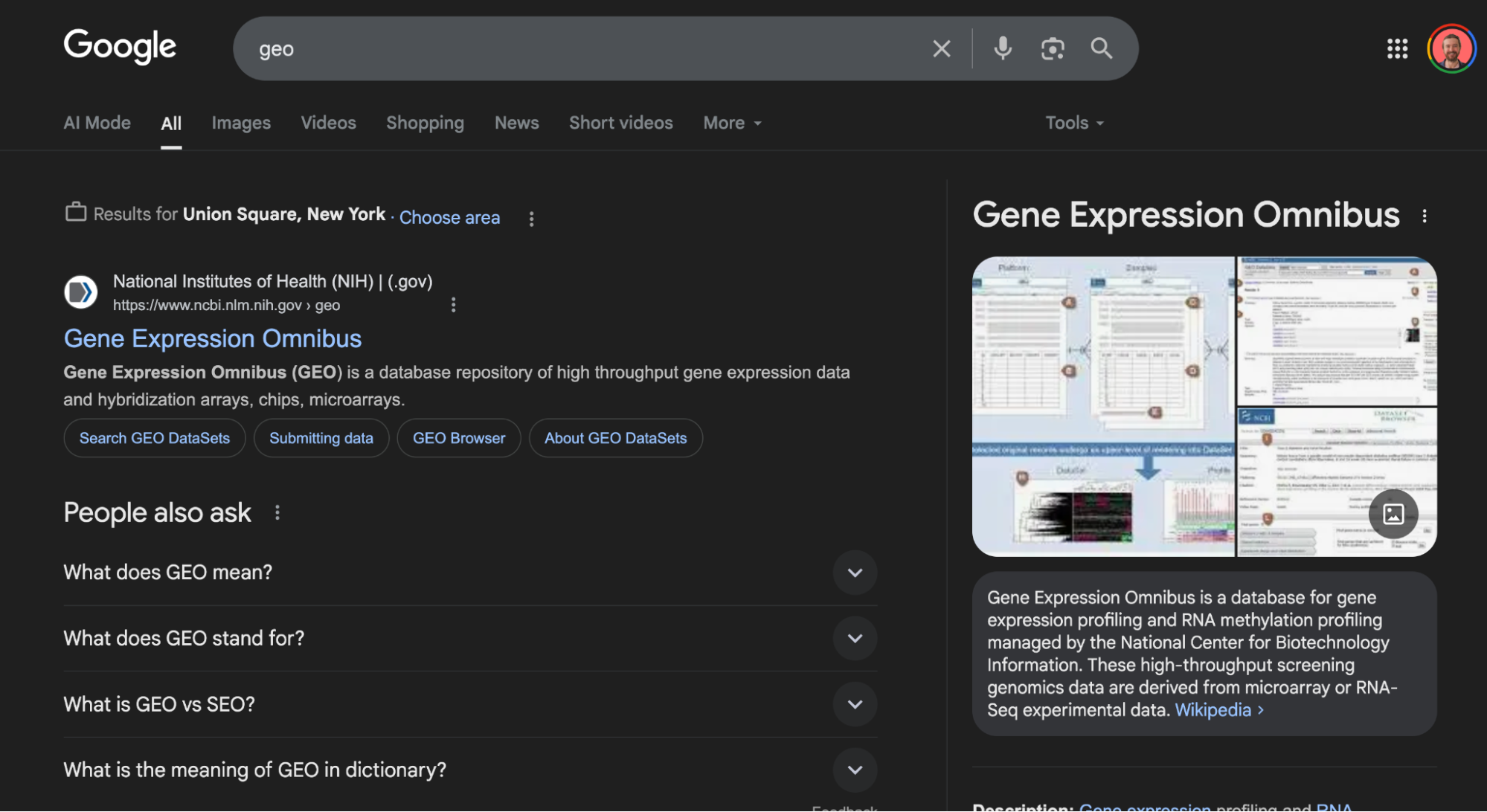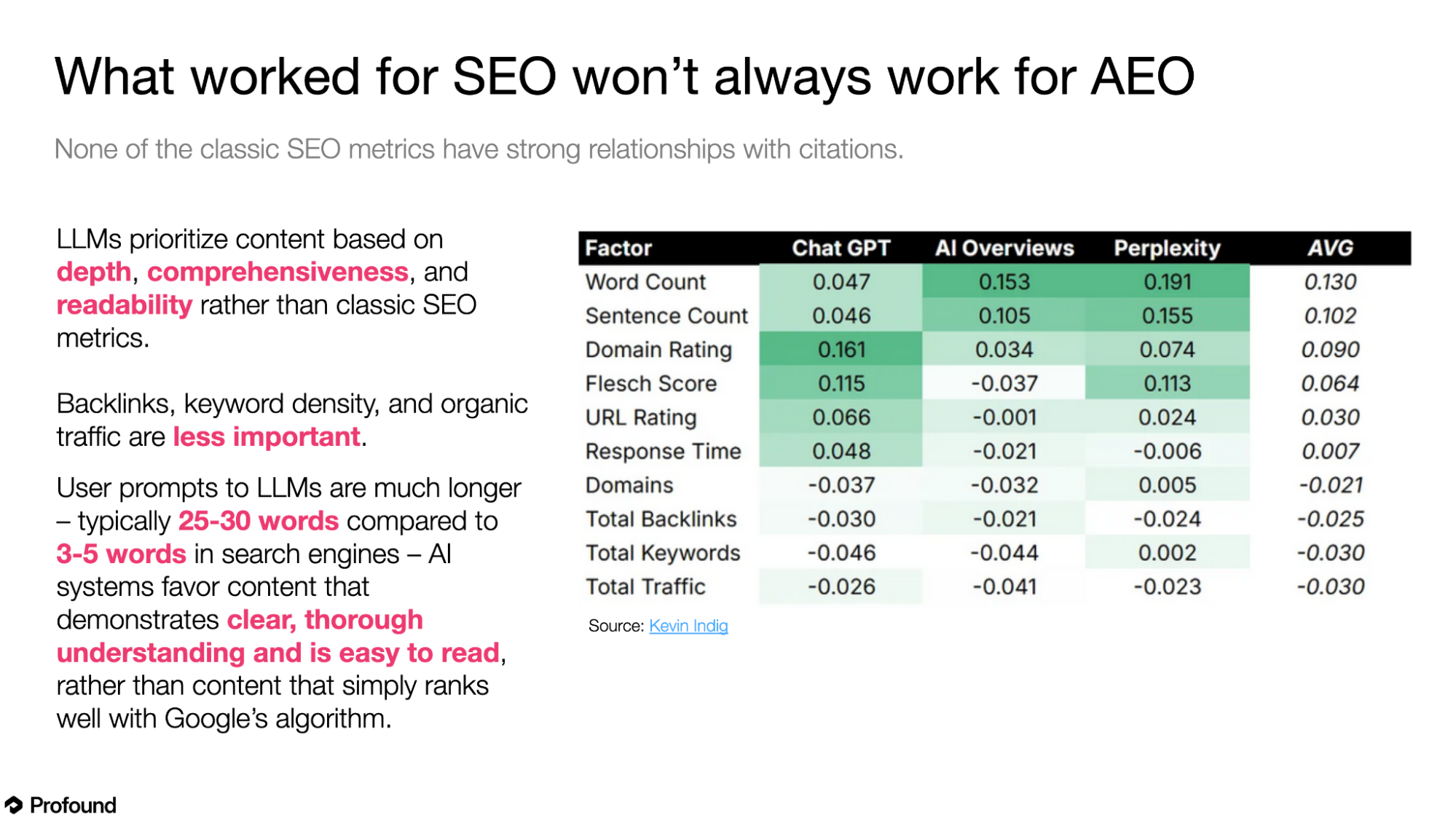Understanding the difference between Answer Engine Optimization (AEO) and Generative Engine Optimization (GEO) and why they're essentially the same strategy.
AI search is reshaping how people find information. But marketers now have a problem. What do we name the process of optimizing for AI search? Marketers love naming things and this is no exception.
Terms like AEO (answer engine optimization), GEO (generative engine optimization), AIO (AI Search Optimization) have all been floated. Andreesen Horrowitz came in with the hammer and called it GEO in their thesis in May 2025.
But, respectively, they named it the wrong thing.
It is our professional opinion that GEO is a bad term. You'd think that marketers would actually be really good at naming things because, you know, it's kind of their job. Why is GEO so bad? We'll get into it more, but the short story is that it's not ownable.
Do me a favor. Google GEO right now. Or don't and blindly trust this screenshot of me doing it.

This is a solid top of page result from Google. The top result is from an authoritative domain (nih.gov). There's a beautiful knowledge panel on the right with images and a wikipedia entry.
Despite this, there's quite a few articles arguing that both GEO and AEO can exist. That they both have their place in the world.
They're wrong too and we're going to talk about it.
Despite the confusion around GEO vs AEO, the fundamental goal hasn't changed: getting your content in front of users as a trusted answer when they ask a question.
Savvy SEO professionals should stick with the term AEO (Answer Engine Optimization) – it's more distinct, enduring, and to be honest, it actually means something clear (after all, when you Google "GEO," we already know what you get).
AEO vs GEO: Two names, one strategy
Answer Engine Optimization (AEO) emerged as Google began displaying featured snippets and knowledge panels. The goal was simple: optimize content so search engines directly answer user queries with your information.
Generative Engine Optimization (GEO) is the newer term for optimizing content for AI-driven search tools like Google's SGE, Bing Chat, and ChatGPT.
But neither are the same as SEO.
Our research has proven a surprisingly small overlap between Google and ChatGPT, and we're not the only ones who have found differences between SEO and AEO.
Kevin Indig's analysis showed that the ranking factors for LLMs are very different from traditional search.

If you're trying to optimize for AI Search, then prominent SEO expert Aleyda Solis put together a fantastic checklist for what to focus on. Some of her recommendations include the following ideas.
AEO optimization tactics
Why we prefer AEO
Clarity: "Answer Engine Optimization" clearly conveys the practice—optimizing for answers. "Generative Engine Optimization" is abstract and could confuse executives.
Distinctiveness: AEO is unique in search marketing. GEO conflicts with geography, geology, and geo-targeting—good luck owning that acronym.
Continuity: AEO builds naturally on existing SEO knowledge. Many professionals are already doing AEO without realizing it. Why make them feel behind the curve with new terminology?
Future-proof: "Answer engines" will remain relevant as long as people seek answers. "Generative engines" might feel outdated once AI becomes the default search experience.
The bottom line
At Profound, we've built our platform and services around the philosophy that providing the best answers – wherever questions are asked – is the key to search visibility.
Whether you label it AEO, GEO, or just next-gen SEO, the mission is the same, and we've been on this mission since day one. We help businesses optimize for answers across all channels, from traditional search engines to cutting-edge AI answer engines.
Our tools unify the approach so you don't have to manage "two separate strategies" for AEO vs GEO – because we know it's all one strategy.
The debate about terminology will probably continue in the industry (marketers do love their acronyms), but our advice is not to get distracted.
Focus on what's constant: People have questions. They turn to search engines, voice assistants, and AI bots for answers. If you consistently provide the most relevant, authoritative answers, you will gain visibility.
Everything else – the algorithms, the interfaces, the acronyms – is just details. Profound is here to ensure those details are handled, so your content shines as the answer no matter the medium.
Ready to embrace an answer-first approach to search? We invite you to stick with AEO and stay ahead of the curve.
Get in touch with us to see how our answer optimization software can elevate your brand's visibility in both today's search results and the emerging AI-driven landscape. In a world of questions, let's make your brand the answer – everywhere.
